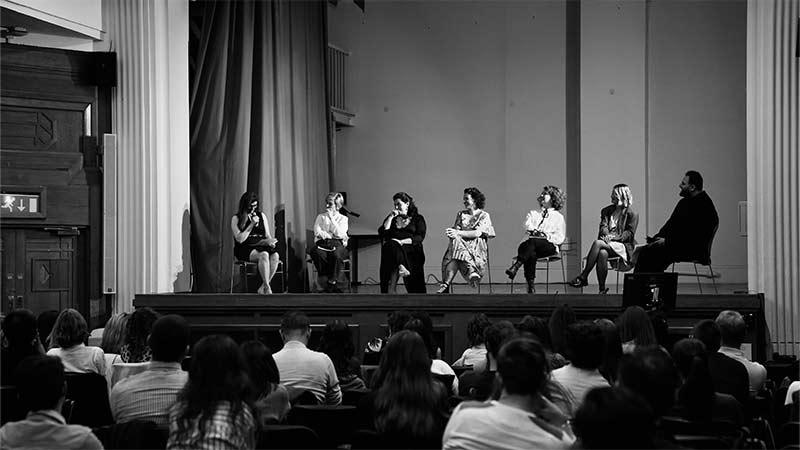The University of Westminster recently hosted Peach Preach, also known in Albanian as Tregime Pjeshkash, a North Macedonian tradition celebrating feminism and women’s rights.

Held at Westminster’s Little Titchfield Street site on 15 May, the theme of this year’s event was named Unveiling and created a space for women to voice stories they have never shared aloud before.
Peach Preach is a storytelling initiative created by Macedonian feminists Rumena Bužarovska and Ana Vasileva in 2016. Inspired by their work, Tregime Pjeshkash was launched in 2017 as an Albanian-language version of the initiative. Founded by Equality, Diversity and Inclusion (EDI) Student Champion and Media, Campaigning and Social Change MA student Guxim Nuhiu, the event has since evolved into a powerful platform for women’s voices, grounded in the belief that personal stories are political tools for resistance, solidarity and change.
The 14th edition of Peach Preach took place for the first time in London. Organised by Guxim, supported by the University, the evening brought together six women from across the Balkan region, Bora Mazreku, Sabina Pacariz, Lejla Dauti, Irina Janakievska, Anastasia Kavada and Fitore Vula, each of whom took the stage to share their personal stories.
Unlike traditional panels, Peach Preach is designed to be intentionally intimate. There are no cameras, no livestreams and no social media documentation. The stories are shared only with those present in the room, creating a quiet, contained space where women can speak freely. This approach offers room for comfort and honesty.
Peach Preach challenges conventional modes of public dialogue and knowledge-sharing by centring lived experiences. It affirms that women's stories are foundational rather than marginal. Peach Preach remains rooted in its core objectives to challenge sexism in everyday and institutional spaces, reclaim space for women to author their own narratives and nurture a culture of oral storytelling that connects generations through memory, experience and voice.
Guxim said: “The personal is always political. And storytelling, when held in a space that is free and safe, becomes a quiet revolution. A reminder that sharing is not weakness, but resistance, power and community.”
This event directly contributes to the United Nations Sustainable Development Goals (SDG) 4: Quality Education and 5: Gender Equality. Since 2019, the University of Westminster has used the SDGs holistically to frame strategic decisions to help students and colleagues fulfil their potential and contribute to a more sustainable, equitable and healthier society.
Learn more about Equality, Diversity and Inclusion at the University of Westminster.





